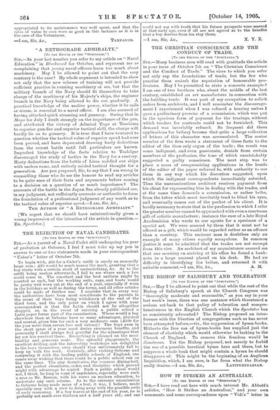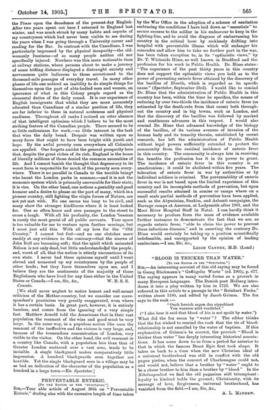[To THE EDITOR OF THE "SPECTATOR." . 1
have read out here with much interest Mr. Abbott's articles, "How it Strikes an Australian," and your own comments and some correspondence upon " Vidi's " letter in
the Times upon the decadence of the present-day English- After two years spent out here I returned to England last winter, and was much struck by many habits and aspects of my countrymen which had never been visible to me durmg the years when I was going through a University career and reading for the Bar. In contrast with the Canadians, I was particularly impressed by the physical incapacity—the old- womanly fussiness—of so many people neither old nor specifically injured. Nowhere was this more noticeable than at railway stations, where persons about to make a journey of some trifling distance displayed a distraught anxiety and nervousness quite ludicrous to those accustomed to the thousand-mile passages of everyday travel. In many other phases of life one noticed an inability to do simple things for themselves upon the part of able-bodied men and women, an ignorance of what in this Colony people regard as the elemental duties of the daily round. It is our experience of English immigrants that whilst they are more accurately educated than Canadians of a similar position of life, they are far inferior to them in natural acuteness and physical readiness. Throughout all ranks I noticed an utter absence of that intelligent optimism which I believe to be the most striking feature of the Canadian people. There seemed to be so little enthusiasm for work,—so little interest in the task that wins the daily bread. Despair was written upon so many faces that ought to have been bright with youth and hope. By the awful poverty seen everywhere all Colonials are appalled. One forgets amidst the general prosperity here that, despite the great riches of its rich, England is the home of literally millions of those denied the common necessities of life. And I cannot banish the thought that degeneracy in its worst form is responsible for much of the poverty seen every- where. There is no parallel in Canada to the terrible beings who haunt the London parks in summer,—and it is not the economic system which is primarily answerable for their state; it is vice. On the other hand, one notices a geniality and good humour and a desire to please on the part of many, which in a pioneer country, still fighting the virgin forces of Nature, are not yet met with. No one seems too busy to be civil, and many show the stranger kindliness where it is least looked for. One so often hears and sees passages in the street to cause a laugh. With all his profanity, the London 'busman is surely the most genial of all public servants. Your space is too valuable for me to venture upon further musings, but I must just add this. With all my love for the "Old Country," I cannot but feel—and no one clutches more readily at any evidence to the contrary—that the sinews of John Bull are becoming soft ; that the spirit which animated Nelson is not only dead, but little understandedfof the people ; and, worst of all, that the nation is utterly unconscious of its own state. I never had these opinions myself until I went abroad and measured up my countrymen by the people of other lands ; but they force themselves upon me, and I believe they are the sentiments of the majority of those Englishmen who have lived for any time either in the United
States or Canada.—I am, Sir, &c., W. B. S. S. Canada.
[We shall never neglect to notice honest and well-meant criticism of the Mother-country, but we consider our corre- spondent's pessimism very greatly exaggerated, even where it has a certain basis. In great part, however, it is entirely baseless, and comes from the ignoring of a very simple fact. Matthew Arnold told the Americans that in their vast population the remnant of the wise and good must be very large. In the same way, in a populous nation like ours the remnant of the ineffective and the vicious is very large, and, because of the tremendous concentration of London, very visible to the visitor. On the other hand, the evil remnant in a country like Canada, with a population less than that of Greater London scattered over a vast area, tends to be invisible. A single blackguard makes comparatively little impression. A hundred blackguards seen together are horrible. Yet the single blackguard seen in a village may be as bad an indication of the character of the population as a hundred in a large town.—En. Spectator.]















































 Previous page
Previous page